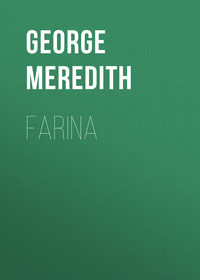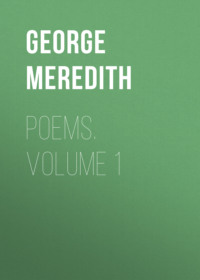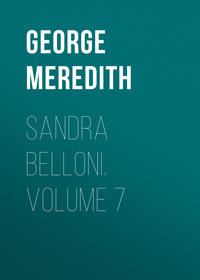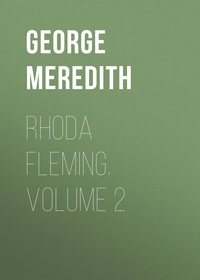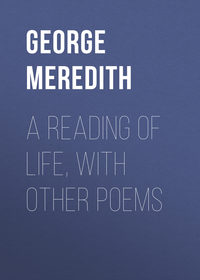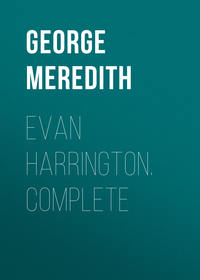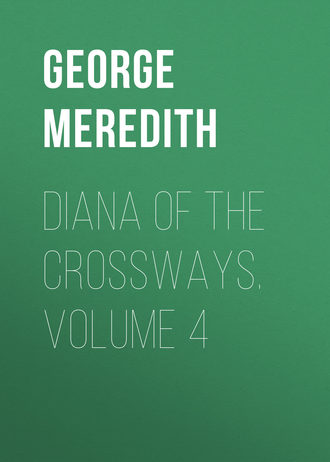
Diana of the Crossways. Volume 4
'Perfectly true!' cried Dacier; and the next minute, heated by approbation, was begging for her hand earnestly. She refused it.
'But you say things that catch me!' he pleaded. 'Remember, it was nearly mine. It soon will be mine. I heard yesterday from Lady Wathin . . . well, if it pains you!'
'Speak on,' said Diana, resigned to her thirsty ears.
'He is not expected to last through the autumn.'
'The calculation is hers?'
'Not exactly:—judging from the symptoms.'
Diana flashed a fiery eye into Dacier's, and rose. She was past danger of melting, with her imagination darkened by the funeral image; but she craved solitude, and had to act the callous, to dismiss him.
'Good. Enough for the day. Now leave me, if you please. When we meet again, stifle that raven's croak. I am not a "Sister of Charity," but neither am I a vulture hovering for the horse in the desert to die. A poor simile!—when it is my own and not another's breath that I want. Nothing in nature, only gruesome German stories will fetch comparisons for the yoke of this Law of yours. It seems the nightmare dream following an ogre's supper.'
She was not acting the shiver of her frame.
To-morrow was open to him, and prospect of better fortune, so he departed, after squeezing the hand she ceremoniously extended.
But her woman's intuition warned her that she had not maintained the sovereign impression which was her security. And hope had become a flame in her bosom that would no longer take the common extinguisher. The race she ran was with a shrouded figure no more, but with the figure of the shroud; she had to summon paroxysms of a pity hard to feel, images of sickness, helplessness, the vaults, the last human silence for the stilling of her passionate heart. And when this was partly effected, the question, Am I going to live? renewed her tragical struggle. Who was it under the vaults, in the shroud, between the planks? and with human sensibility to swell the horror! Passion whispered of a vaster sorrow needed for herself; and the hope conjuring those frightful complexities was needed to soothe her. She pitied the man, but she was an enamoured woman. Often of late she had been sharply stung, relaxed as well, by the observations of Danvers assisting at her toilette. Had she beauty and charm, beauty and rich health in the young summer blooming of her days? —and all doomed to waste? No insurgency of words arose in denunciation of the wrong done to her nature. An undefined heavy feeling of wrong there was, just perceptive enough to let her know, without gravely shaming, that one or another must be slain for peace to come; for it is the case in which the world of the Laws overloading her is pitiless to women, deaf past ear-trumpets, past intercession; detesting and reviling them for a feeble human cry, and for one apparent step of revolt piling the pelted stones on them. It will not discriminate shades of hue, it massacres all the shadowed. They are honoured, after a fashion, at a certain elevation. Descending from it, and purely to breathe common air (thus in her mind), they are scourged and outcast. And alas! the very pleading for them excites a sort of ridicule in their advocate. How? She was utterly, even desperately, nay personally, earnest, and her humour closed her lips; though comical views of the scourged and outcast coming from the opposite party—the huge bully world—she would not have tolerated. Diana raged at a prevailing strength on the part of that huge bully world, which seemed really to embrace the atmosphere. Emma had said: 'The rules of Christian Society are a blessed Government for us women. We owe it so much that there is not a brick of the fabric we should not prop.' Emma's talk of obedience to the Laws, being Laws, was repeated by the rebel, with an involuntary unphrased comparison of the vessel in dock and the vessel at sea.
When Dacier next called to see Mrs. Warwick, he heard that she had gone to Copsley for a couple of weeks. The lesson was emphasized by her not writing:—and was it the tricky sex, or the splendid character of the woman, which dealt him this punishment? Knowing how much Diana forfeited for him, he was moved to some enthusiasm, despite his inclination to be hurt.
She, on her return to London, gained a considerable increase of knowledge as to her position in the eye of the world; and unlike the result of her meditations derived from the clamouring tradesmen, whom she could excuse, she was neither illuminated nor cautioned by that dubious look; she conscientiously revolted. Lady Pennon hinted a word for her Government. 'A good deal of what you so capitally call "Green tea talk" is going on, my dear.' Diana replied, without pretending to misunderstand.
'Gossip is a beast of prey that does not wait for the death of the creature it devours. They are welcome to my shadow, if the liberty I claim casts one, and it feeds them.' To which the old lady rejoined: 'Oh! I am with you through thick and thin. I presented you at Court, and I stand by you. Only, walk carefully. Women have to walk with a train. You are too famous not to have your troops of watchers.'
'But I mean to prove,' said Diana, 'that a woman can walk with her train independent of the common reserves and artifices.'
'Not on highways, my dear!'
Diana, praising the speaker, referred the whole truth in that to the material element of her metaphor.
She was more astonished by Whitmonby's candid chiding; but with him she could fence, and men are easily diverted. She had sent for him, to bring him and Percy Dacier together to a conference. Unaware of the project, he took the opportunity of their privacy to speak of the great station open to her in London being imperilled; and he spoke of 'tongues,' and ahem! A very little would have induced him to fill that empty vocable with a name.
She had to pardon the critic in him for an unpleasant review of her hapless CANTATRICE; and as a means of evasion, she mentioned the poor book and her slaughter of the heroine, that he had complained of.
'I killed her; I could not let her live. You were unjust in accusing the authoress of heartlessness.'
'If I did, I retract,' said he. 'She steers too evidently from the centre of the vessel. She has the organ in excess.'
'Proof that it is not squandered.'
'The point concerns direction.'
'Have I made so bad a choice of my friends?'
'It is the common error of the sprightly to suppose that in parrying a thrust they blind our eyes.'
'The world sees always what it desires to see, Mr. Whitmonby.'
'The world, my dear Mrs. Warwick, is a blundering machine upon its own affairs, but a cruel sleuth-hound to rouse in pursuit.'
'So now you have me chased by sight and scent. And if I take wing?'
'Shots! volleys!—You are lawful game. The choice you have made of your friends, should oblige you to think of them.'
'I imagine I do. Have I offended any, or one?'
'I will not say that. You know the commotion in a French kitchen when the guests of the house declined a particular dish furnished them by command. The cook and his crew were loyal to their master, but, for the love of their Art, they sent him notice. It is ill serving a mad sovereign.'
Diana bowed to the compact little apologue.
'I will tell you another story, traditional in our family from my great- grandmother, a Spanish woman,' she said. 'A cavalier serenaded his mistress, and rascal mercenaries fell upon him before he could draw sword. He battered his guitar on their pates till the lattice opened with a cry, and startled them to flight. "Thrice blessed and beloved!" he called to her above, in reference to the noise, "it was merely a diversion of the accompaniment." Now there was loyal service to a sovereign!'
'You are certainly an angel!' exclaimed Whitmonby. 'I swallow the story, and leave it to digestion to discover the appositeness. Whatever tuneful instrument one of your friends possesses shall solace your slumbers or batter the pate of your enemy. But discourage the habitual serenader.'
'The musician you must mean is due here now, by appointment to meet you,' said Diana, and set him momentarily agape with the name of Mr. Percy Dacier.
That was the origin of the alliance between the young statesman and a newspaper editor. Whitmonby, accepting proposals which suited him, quitted the house, after an hour of political talk, no longer inclined to hint at the 'habitual serenader,' but very ready to fall foul of those who did, as he proved when the numbers buzzed openly. Times were masculine; the excitement on the eve of so great a crisis, and Diana's comprehension of it and fine heading cry, put that weak matter aside. Moreover, he was taught to suppose himself as welcome a guest as Dacier; and the cook could stand criticism; the wines—wonderful to say of a lady's table—were trusty; the talk, on the political evenings and the social and anecdotal supper-nights, ran always in perfect accord with his ideal of the conversational orchestra: an improvized harmony, unmatched elsewhere. She did not, he considered, so perfectly assort her dinner- guests; that was her one fault. She had therefore to strain her adroitness to cover their deficiencies and fuse them. But what other woman could have done it! She led superbly. If an Irishman was present, she kept him from overflooding, managed to extract just the flavour of him, the smack of salt. She did even, at Whitmonby's table, on a red- letter Sunday evening, in concert with him and the Dean, bring down that cataract, the Bodleian, to the levels of interchanging dialogue by seasonable touches, inimitably done, and never done before. Sullivan Smith, unbridled in the middle of dinner, was docile to her. 'Irishmen;' she said, pleading on their behalf to Whitmonby, who pronounced the race too raw for an Olympian feast, 'are invaluable if you hang them up to smoke and cure'; and the master of social converse could not deny that they were responsive to her magic. The supper-nights were mainly devoted to Percy's friends. He brought as many as he pleased, and as often as it pleased him; and it was her pride to provide Cleopatra banquets for the lover whose anxieties were soothed by them, and to whom she sacrificed her name willingly in return for a generosity that certain chance whispers of her heart elevated to the pitch of measureless.
So they wore through the Session and the Autumn, clouds heavier, the League drumming, the cry of Ireland 'ominously Banshee,' as she wrote to Emma.
CHAPTER XXX
IN WHICH THERE IS A TASTE OF A LITTLE DINNER AND AN AFTERTASTE
'But Tony lives!' Emma Dunstane cried, on her solitary height, with the full accent of envy marking the verb; and when she wrote enviously to her friend of the life among bright intelligences, and of talk worth hearing, it was a happy signification that health, frail though it might be, had grown importunate for some of the play of life. Diana sent her word to name her day, and she would have her choicest to meet her dearest. They were in the early days of December, not the best of times for improvized gatherings. Emma wanted, however, to taste them as they cropped; she was also, owing to her long isolation, timid at a notion of encountering the pick of the London world, prepared by Tony to behold 'a wonder more than worthy of them,' as her friend unadvisedly wrote. That was why she came unexpectedly, and for a mixture of reasons, went to an hotel. Fatality designed it so. She was reproached, but she said: 'You have to write or you entertain at night; I should be a clog and fret you. My hotel is Maitland's; excellent; I believe I am to lie on the pillow where a crowned head reposed! You will perceive that I am proud as well as comfortable. And I would rather meet your usual set of guests.'
'The reason why I have been entertaining at night is, that Percy is harassed and requires enlivening,' said Diana. 'He brings his friends. My house is open to them, if it amuses him. What the world says, is past a thought. I owe him too much.'
Emma murmured that the world would soon be pacified.
Diana shook her head. 'The poor man is better; able to go about his affairs; and I am honestly relieved. It lays a spectre. As for me, I do not look ahead. I serve as a kind of secretary to Percy. I labour at making abstracts by day, and at night preside at my suppertable. You would think it monotonous; no incident varies the course we run. I have no time to ask whether it is happiness. It seems to bear a resemblance.'
Emma replied: 'He may be everything you tell me. He should not have chosen the last night of the Opera to go to your box and sit beside you till the fall of the curtain. The presence at the Opera of a man notoriously indifferent to music was enough in itself.'
Diana smiled with languor. 'You heard of that? But the Opera was The Puritani, my favourite. And he saw me sitting in Lady Pennon's box alone. We were compromised neck-deep already. I can kiss you, my own Emmy, till I die; 'but what the world says, is what the wind says. Besides he has his hopes…. If I am blackened ever so thickly, he can make me white. Dear me! if the world knew that he comes here almost nightly! It will; and does it matter? I am his in soul; the rest is waste-paper—a half-printed sheet.'
'Provided he is worthy of such devotion!'
'He is absolute worthiness. He is the prince of men: I dread to say, mine! for fear. But Emmy will not judge him to-morrow by contrast with more voluble talkers.—I can do anything but read poetry now. That kills me!—See him through me. In nature, character, intellect, he has no rival. Whenever I despond—and it comes now and then—I rebuke myself with this one admonition.
Simply to have known him! Admit that for a woman to find one who is worthy among the opposite creatures, is a happy termination of her quest, and in some sort dismisses her to the Shades, an uncomplaining ferry- bird. If my end were at hand I should have no cause to lament it. We women miss life only when we have to confess we have never met the man to reverence.'
Emma had to hear a very great deal of Mr. Percy. Diana's comparison of herself to 'the busy bee at a window-pane,' was more in her old manner; and her friend would have hearkened to the marvels of the gentle man less unrefreshed, had it not appeared to her that her Tony gave in excess for what was given in return. She hinted her view. . .
'It is expected of our sex,' Diana said.
The work of busy bee at a window-pane had at any rate not spoilt her beauty, though she had voluntarily, profitlessly, become this man's drudge, and her sprightly fancy, her ready humour and darting look all round in discussion, were rather deadened.
But the loss was not perceptible in the circle of her guests. Present at a dinner little indicating the last, were Whitmonby, in lively trim for shuffling, dealing, cutting, trumping or drawing trumps; Westlake, polishing epigrams under his eyelids; Henry Wilmers, who timed an anecdote to strike as the passing hour without freezing the current; Sullivan Smith, smoked, cured and ready to flavour; Percy Dacier, pleasant listener, measured speaker; and young Arthur Rhodes, the neophyte of the hostess's training; of whom she had said to Emma, 'The dear boy very kindly serves to frank an unlicenced widow'; and whom she prompted and made her utmost of, with her natural tact. These she mixed and leavened. The talk was on high levels and low; an enchantment to Emma Dunstane: now a story; a question opening new routes, sharp sketches of known personages; a paradox shot by laughter as soon as uttered; and all so smoothly; not a shadow of the dominant holder-forth or a momentary prospect of dead flats; the mellow ring of appositeness being the concordant note of deliveries running linked as they flashed, and a tolerant philosophy of the sage in the world recurrently the keynote.
Once only had Diana to protect her nurseling. He cited a funny line from a recent popular volume of verse, in perfect A propos, looking at Sullivan Smith; who replied, that the poets had become too many for him, and he read none now. Diana said: 'There are many Alexanders, but Alexander of Macedon is not dwarfed by the number.' She gave him an opening for a smarter reply, but he lost it in a comment—against Whitmonby's cardinal rule: 'The neatest turn of the wrist that ever swung a hero to crack a crown!' and he bowed to young Rhodes: 'I 'll read your versicler to-morrow morning early.' The latter expressed a fear that the hour was too critical for poetry.
'I have taken the dose at a very early hour,' said Whitmonby, to bring conversation to the flow again, 'and it effaced the critical mind completely.'
'But did not silence the critical nose,' observed Westlake.
Wilmers named the owner of the longest nose in Europe.
'Potentially, indeed a critic!' said Diana.
'Nights beside it must be fearful, and good matter for a divorce, if the poor dear lady could hale it to the doors of the Vatican!' Sullivan Smith exclaimed. 'But there's character in noses.'
'Calculable by inches?' Dacier asked.
'More than in any other feature,' said Lady Dunstane. 'The Riffords are all prodigiously gifted and amusing: suspendens omnia naso. It should be prayed for in families.'
'Totum ut to faciant, Fabulle, nasum,' rejoined Whitmonby. 'Lady Isabella was reading the tale of the German princess, who had a sentinel stationed some hundred yards away to whisk off the flies, and she owned to me that her hand instinctively travelled upward.'
'Candour is the best concealment, when one has to carry a saddle of absurdity,' said Diana. 'Touchstone's "poor thing, but mine own," is godlike in its enveloping fold.'
'The most comforting sermon ever delivered on property in poverty,' said
Arthur Rhodes.
Westlake assented. 'His choice of Audrey strikes me as an exhibition of the sure instinct for pasture of the philosophical jester in a forest.'
' With nature's woman, if he can find her, the urban seems equally at home,' said Lady Dunstane.
'Baron Pawle is an example,' added Whitmonby. 'His cook is a pattern wife to him. I heard him say at table that she was responsible for all except the wines. "I wouldn't have them on my conscience, with a Judge!" my lady retorted.'
'When poor Madame de Jacquieres was dying,' said Wilmers, 'her confessor sat by her bedside, prepared for his ministrations. "Pour commencer, mon ami, jamais je n'ai fait rien hors nature."'
Lord Wadaster had uttered something tolerably similar: 'I am a sinner, and in good society.' Sir Abraham Hartiston, a minor satellite of the Regent, diversified this: 'I am a sinner, and go to good society.' Madame la Comtesse de la Roche-Aigle, the cause of many deaths, declared it unwomanly to fear anything save 'les revenants.' Yet the countess could say the pretty thing: 'Foot on a flower, then think of me!'
'Sentimentality puts up infant hands for absolution,' said Diana.
'But tell me,' Lady Dunstane inquired generally, 'why men are so much happier than women in laughing at their spouses?'
They are humaner, was one dictum; they are more frivolous, ironically another.
'It warrants them for blowing the bugle-horn of masculine superiority night and morning from the castle-walls,' Diana said.
'I should imagine it is for joy of heart that they still have cause to laugh!' said Westlake.
On the other hand, are women really pained by having to laugh at their lords? Curious little speeches flying about the great world, affirmed the contrary. But the fair speakers were chartered libertines, and their laugh admittedly had a biting acid. The parasite is concerned in the majesty of the tree.
'We have entered Botany Bay,' Diana said to Emma; who answered: 'A metaphor is the Deus ex machine, of an argument'; and Whitmonby, to lighten a shadow of heaviness, related allusively an anecdote of the Law Courts. Sullivan Smith begged permission to 'black cap' it with Judge FitzGerald's sentence upon a convicted criminal: 'Your plot was perfect but for One above.' Dacier cited an execrable impromptu line of the Chief of the Opposition in Parliament. The Premier, it was remarked, played him like an angler his fish on the hook; or say, Mr. Serjeant Rufus his witness in the box.
'Or a French journalist an English missionary,' said Westlake; and as the instance was recent it was relished.
The talk of Premiers offered Whitmonby occasion for a flight to the Court of Vienna and Kaunitz. Wilmers told a droll story of Lord Busby's missing the Embassy there. Westlake furnished a sample of the tranquil sententiousness of Busby's brother Robert during a stormy debate in the House of Commons.
'I remember,' Dacier was reminded, 'hearing him say, when the House resembled a Chartist riot, "Let us stand aside and meditate on Life. If Youth could know, in the season of its reaping of the Pleasures, that it is but sowing Doctor's bills!"'
Latterly a malady had supervened, and Bob Busby had retired from the universal to the special;—his mysterious case.
'Assure him, that is endemic. He may be cured of his desire for the exposition of it,' said Lady Dunstane.
Westlake chimed with her: 'Yes, the charm in discoursing of one's case is over when the individual appears no longer at odds with Providence.'
'But then we lose our Tragedy,' said Whitmonby.
'Our Comedy too,' added Diana. 'We must consent to be Busbied for the sake of the instructive recreations.'
'A curious idea, though,' said Sullivan Smith, 'that some of the grand instructive figures were in their day colossal bores!'
'So you see the marvel of the poet's craft at last?' Diana smiled on him, and he vowed: 'I'll read nothing else for a month!' Young Rhodes bade him beware of a deluge in proclaiming it.
They rose from table at ten, with the satisfaction of knowing that they had not argued, had not wrangled, had never stagnated, and were digestingly refreshed; as it should be among grown members of the civilized world, who mean to practise philosophy, making the hour of the feast a balanced recreation and a regeneration of body and mind.
'Evenings like these are worth a pilgrimage,' Emma said, embracing Tony outside the drawing-room door. 'I am so glad I came: and if I am strong enough, invite me again in the Spring. To-morrow early I start for Copsley, to escape this London air. I shall hope to have you there soon.'
She was pleased by hearing Tony ask her whether she did not think that Arthur Rhodes had borne himself well; for it breathed of her simply friendly soul.
The gentlemen followed Lady Dunstane in a troop, Dacier yielding perforce the last adieu to young Rhodes.
Five minutes later Diana was in her dressing-room, where she wrote at night, on the rare occasions now when she was left free for composition. Beginning to dwell on THE MAN OF TWO MINDS, she glanced at the woman likewise divided, if not similarly; and she sat brooding. She did not accuse her marriage of being the first fatal step: her error was the step into Society without the wherewithal to support her position there. Girls of her kind, airing their wings above the sphere of their birth, are cryingly adventuresses. As adventuresses they are treated.
Vain to be shrewish with the world! Rather let us turn and scold our nature for irreflectively rushing to the cream and honey! Had she subsisted on her small income in a country cottage, this task of writing would have been holiday. Or better, if, as she preached to Mary Paynham, she had apprenticed herself to some productive craft. The simplicity of the life of labour looked beautiful. What will not look beautiful contrasted with the fly in the web? She had chosen to be one of the flies of life.
Instead of running to composition, her mind was eloquent with a sermon to Arthur Rhodes, in Redworth's vein; more sympathetically, of course. 'For I am not one of the lecturing Mammonites!' she could say.
She was far from that. Penitentially, in the thick of her disdain of the arrogant money-Betters, she pulled out a drawer where her bank-book lay, and observed it contemplatively; jotting down a reflection before the dread book of facts was opened: 'Gaze on the moral path you should have taken, you are asked for courage to commit a sanctioned suicide, by walking back to it stripped—a skeleton self.' She sighed forth: 'But I have no courage: I never had!' The book revealed its tale in a small pencilled computation of the bank-clerk's; on the peccant side. Credit presented many pages blanks. She seemed to have withdrawn from the struggle with such a partner.


